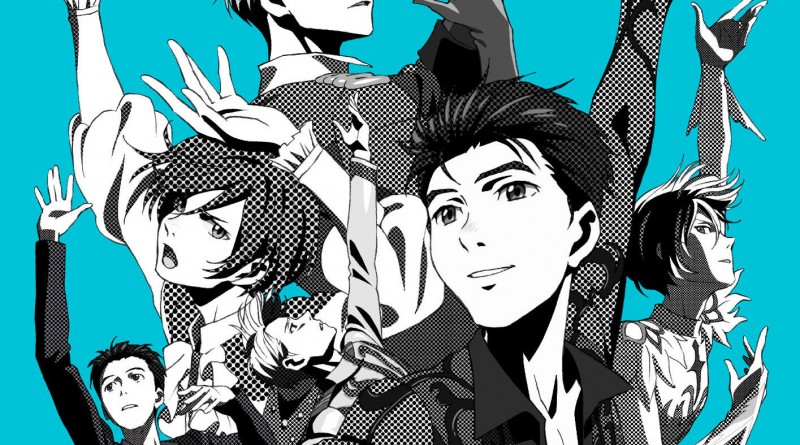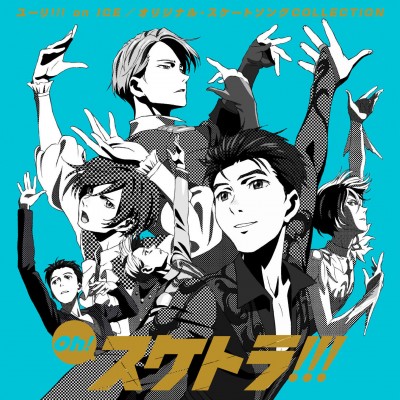Oh! Skatra!!! YURI!!! on ICE Original Skate Song COLLECTION – Review
| Album Title: | Oh! Skatra!!! YURI!!! on ICE Original Skate Song COLLECTION |
|---|---|
| Anime Title: | YURI!!! on Ice |
| Artist: | Taku Matsushiba, Taro Umebayashi, Tomonori Hayashibe, Nozomu Yoneda, Keisuke Tominaga, Ludwig van Beethoven |
| Catalog Number: | EYCA-11291 |
| Release Type: | Soundtrack |
| Release Date: | December 21, 2016 |
| Purchase at: | CDJapan, Play-Asia, iTunes |
Tracklist
[spoiler]
| Track Title | Artist | Time |
|---|---|---|
| 01. Aria 《Stammi vicino, non te ne andare》 | Taku Matsushiba, Tenor: Kazuma Kudo | 3:41 |
| 02. In Regards to Love ~Eros~ | Taku Matsushiba (feat. Jin Oki) | 2:16 |
| 03. Yuri on ICE | Taro Umebayashi | 3:42 |
| 04. In Regards to Love ~Agape~ | Taku Matsushiba (Boy Soprano£: Ryutaro Sugiyama) | 2:20 |
| 05. Piano concerto in B-minor: Allegro Appasionato | Taku Matsushiba | 3:47 |
| 06. Minami’s Boogie | Taro Umebayashi | 3:33 |
| 07. Shall We Skate? | Taku Matsushiba featuring The Soulmat | 2:15 |
| 08. Terra Incognita | Taku Matsushiba featuring U-zhaan | 3:41 |
| 09. La Parfum de Fleurs | Taku Matsushiba | 2:06 |
| 10. The Inferno | Taku Matsushiba | 3:44 |
| 11. A Tales of Sleeping Prince | Taro Umebayashi featuring AISHA | 3:38 |
| 12. Still Alive | Taro Umebayashi featuring MATT CAB & WISE | 2:10 |
| 13. Intoxicated | Taro Umebayashi featuring Jovette Rivera | 2:09 |
| 14. Rapsodie espagnole | Taro Umebayashi | 3:39 |
| 15. Almavivo | Taro Umebayashi | 2:17 |
| 16. Anastasis | Taro Umebayashi | 3:42 |
| 17. L’homme Arme | Taku Matsushiba & Nozomu Yoneda | 2:15 |
| 18. Serenade for Two | Taro Umebayashi & Taku Matsushiba featuring Wouter Hamel | 3:37 |
| 19. Theme of King JJ | Taro Umebayashi featuring Linus Norda | 3:42 |
| 20. Partizan Hope | Taro Umebayashi & Keisuke Tominaga | 3:42 |
| 21. Samarkand Overture | Taku Matsushiba | 2:11 |
| 22. Beethoven: Symphony No. 9, 2. Movement “Advent” -Genesis Edition- | Ludwig van Beethoven & Taku Matsushiba | 3:40 |
| 23. Welcome to The Madness | Taro Umebayashi (Vocal: Steve McNair) | 2:37 |
| 24. Duetto 《Stammi vicino, non te ne andare》 | Taku Matsushiba (Tenor:Kazuma Kudo, Soprano:Rinko Matsubara) | 2:40 |
[/spoiler]
Review: Yuri on Ice’s blend of music and visual artistry in its skating routines echo that of real life. Just as I found myself enthralled by watching Michelle Kwan skate to Rachmaninoff’s 3rd Piano Concerto, so did I find myself captivated by Yuri on Ice’s programs featuring an assortment of music ranging from classical to rock to hip hop to electronica. The colorful personalities, aspirations and anxieties all, would emerge through the music to give Yuri on Ice a spellbinding effect.
It’s hard for me to recall the last time an anime album overwhelmed me with its sheer musical diversity and character. The music in Yuri on Ice seemed to be pulled from the best each genre had to offer. Throughout the listening experience, I smiled here, I chuckled there, but above all, I was left in awe at how the story unfolds through the music.
Yuri on Ice’s Oh! Skatra!!! starts off with the beautiful operatic “Aria 《Stammi vicino, non te ne andare》”. Its starry-eyed sentiments, delivered by tenor Kazuma Kudo, unveils itself with a grace and majesty. Throughout the “Aria”, Kudo’s performance and composer Taku Matsushiba’s efforts bring to mind operatic classics like Puccini’s “Nessun Dorma”, especially in how Kudo’s emphatic singing expresses a fervent desire for two souls to come together to dance as one. The “Aria” would lay the foundation for what’s to come, doing so brilliantly.
Aria 《Stammi vicino, non te ne andare》
[audio:1 Yurionice.mp3]
From here, Yuri on Ice’s story unfolds with two very different personalities embarking upon the same theme of stepping outside their comfort zones. The anime manifests that concept with two arrangements of “In Regards to Love” (“Eros” and “Agape”). In “Eros”, the guitars set an aggressive pace followed by the violins accompanied by energetic, rhythmic clapping. The latter combination gives it a Spanish flavor that evokes a Don Juan type of figure, with a seductive program to match. “Agape”, on the other hand, is far more innocent and reserved, leading to a more introspective routine. In his performance, singer Ryutaro Sugiyama succeeds in reaching deep within his soul to convey a limerence that feels authentic and poignant.
In Regards to Love ~Eros~
[audio:2 Yurionice.mp3]In Regards to Love ~Agape~
[audio:4 Yurionice.mp3]
The remainder of the album focuses on expressing each skater’s personalities through their music selection for their skate routine. “Yuri on ICE” while ubiquitous throughout the series, never gets old. Yuri’s personality shines through the piece’s initial tentative piano ostinato. Little by little, the piece opens, leaping and bounding over the obstacles in its path to blossom radiantly. As it draws to a close, a more confident, determined Yuri strides forth and I couldn’t help but to cheer him on.
Yuri on ICE
[audio:3 Yurionice.mp3]
“Yuri on ICE’s” progression is slow. In a sharp contrast, Yuri Plisetsky, Yuri’s temperamental rival, leaps onto the rink with the fiery, impatient “Piano Concerto in B-minor: Allegro Appasionato”. The piece draws inspiration from Tchaikovsky’s 1st Piano Concerto as its thrilling intensity and drama ebbs and flows its way to becoming my favorite track in the album. And no, it’s not just because I love how they tied in the fact that Yuri Plisetsky’s choreographer would want to use a Tchaikovsky-esque piece on account of her being a ballerina trainer.
Piano Concerto in B-minor: Allegro Appasionato
[audio:5 Yurionice.mp3]
So while the classical pieces reigned as my favorites in the album, other characters’ skate music selections also garnered much delight. When I said I smiled while listening to the album, part of it was on account of Phichit Chulanont, Yuri’s more gregarious friend, whose music is wonderfully carefree. “Shall We Skate” epitomizes his disposition through a cheery string section that leads to the flashy, extroverted, and as a result, unforgettable, exclamation of the titular line, delivered with aplomb.
Shall We Skate
[audio:7 Yurionice.mp3]
But, of course, if we were to talk about any moments that were unforgettable, Jean-Jacques Leroy’s “Theme of King JJ” easily tops that list. A rock song that features an enthusiastic performance by Linus Norda, I found myself impressed by its scale as it relishes no small effort in trying to make the Jean-Jacques Leroy persona bigger than himself. One part aspirational and all parts fun, the way the song keeps piling on the bold proclamations and pronouncements left me pumped up as though greatness was within reach.
Theme of King JJ
[audio:19 Yurionice.mp3]
Along the way, the album dispenses with some waltz-like fare (“La Parfum de Fleurs”) and grim orchestrals “Samarkand Overture” that fit the skater Otabek Altin’s stoic, but focused, demeanor. There was also an erotic moment (“Intoxicated”) that felt a bit too in-my-face, a few nods to unrequited love (the longing R&B track “A Tales of Sleeping Prince” and the sigh-inducing “Serenade for Two”), and a very robotic piece in “Anastasis” that features approachable electronica (a big plus, given my apathy for the genre in general). The only track I didn’t care for was “Welcome to the Madness”, which is quite mad, especially for one who isn’t a metalhead. For me, it’s an automatic skip.
La Parfum de Fleurs
[audio:9 Yurionice.mp3]A Tales of Sleeping Prince
[audio:11 Yurionice.mp3]Anastasis
[audio:16 Yurionice.mp3]Welcome to the Madness
[audio:23 Yurionice.mp3]
And in skipping, we alight upon a proper bookending in the form of “Duetto 《Stammi vicino, non te ne andare》”, which takes the opening track “Aria”, and adds soprano Rinko Matsubara. Together, she, along with tenor Kazuma Kodo, poignantly creates a sense of togetherness that transcends time and space to erase the initial loneliness and allow an internal strength to take hold and elevate the duo to be able to realize their potential. The performance is beautiful and I couldn’t help but feel inspired.
Duetto 《Stammi vicino, non te ne andare》
[audio:24 Yurionice.mp3]
It’s not a stretch to say that Yuri on Ice’s Oh! Skatra!!! is a special album, rich in character to where it’s unforgettable. I loved how its principal composers, Taku Matsushiba and Taro Umebayashi, went all out in all those different genres to deliver an effort that was consistently engaging and enthralling. It is through their music that each character’s spectrum of passions allows Yuri on Ice to etch itself in your memory with the clarity of sunlight glinting off the ice at a nearby skate pond.
Rating: Excellent



I’m not quite as in love with this soundtrack as you are, mainly because of it non-cohesive nature as a collection of songs rather than a soundtrack that represents the show as a whole. I can’t say I remember much of the actual music from the show itself. That being said, as far as production values go, this soundtrack definitely did its job to convey the diversity of the music used for skating. Some of the tracks are just outstanding though, like La Parfum de Fleurs.
As far as what to review next, I would love to hear your take on Iwasaki’s Stray Dogs or MICHIRU’s Izetta. Both of them were my favorites from last season. Iwasaki temporarily left his bizarre experiments for Stray Dogs, and Izetta was surprising- someone who pulled off Kajiura better than Kajiura has sounded in years.
Iwasaki really outdid himself with both Bungou Stray Dogs OSTs which count as one of his best works. It’s kind of funny since in the same year he composed utterly bland and frankly boring soundtrack for Qualidea Code which counts as one of his worst music endeavours, at least for me.
Yuuri!!! on ICE Song Collection is musically very good but what baffles me is the other stuff of the release. The casing illustrations, booklet and the visual presentation in general. It’s just bland. Even Hiramatsu Tadashi’s cover illustration looks quite iffy (the colour design doesn’t help a bit), though this was most likely caused by the hellish production scheduling of the anime where nobody in the animation team had really any time for anything.
Well, I think it’s pretty obvious which soundtrack I’ll go for next. Will probably watch a few episodes of Bungou to get into the show’s atmosphere/music and understand a bit of the context.
If you do decide to take a look at BSD’s music, I suggest focusing more on the second soundtrack than the first. That’s where the real meat of the music lies.
Pingback:Yuri on Ice Soundtrack Reviews